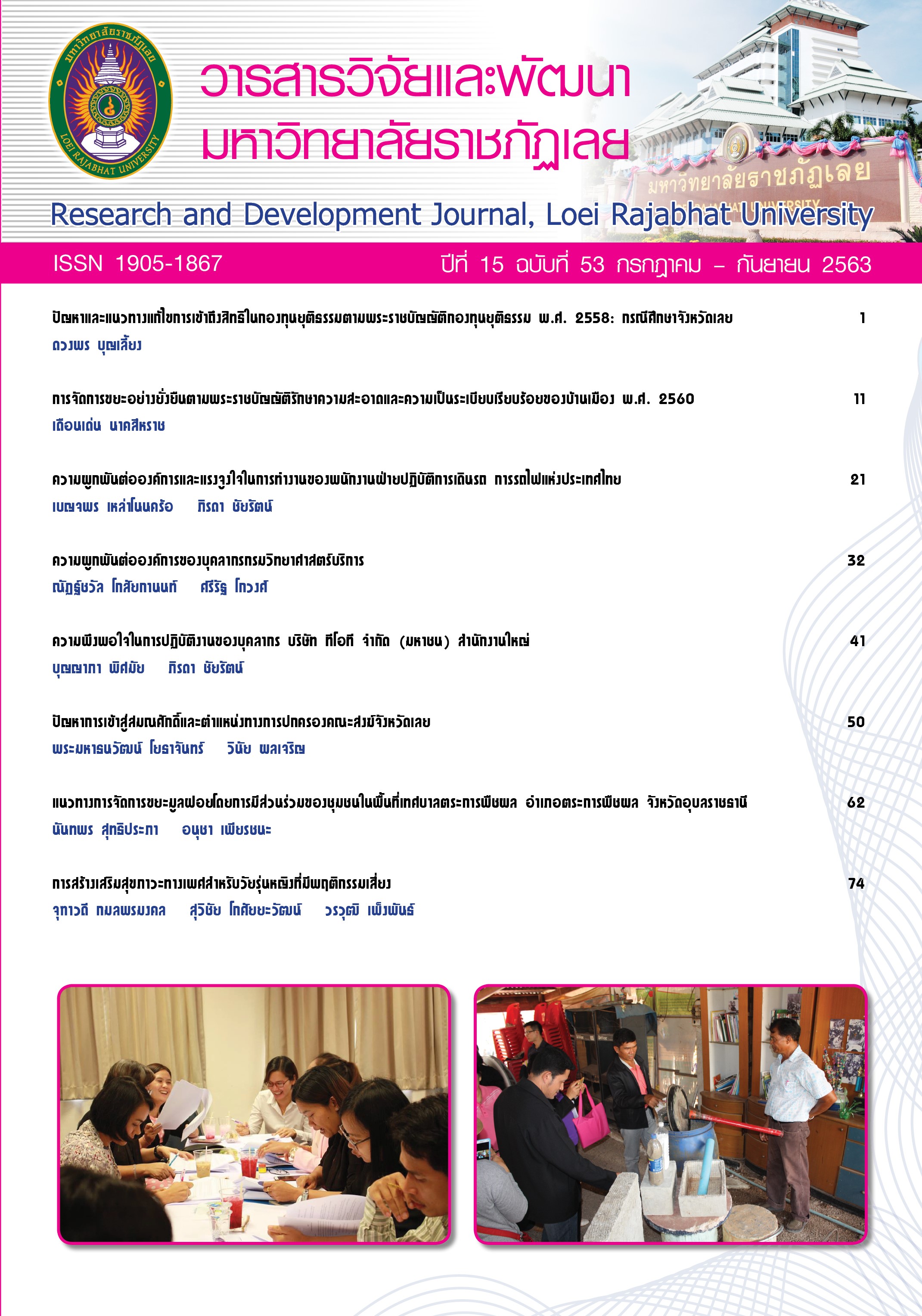The Problem of Entry Into the Ecclesiastical Titles and Position of the Clergy in Loei Province
Keywords:
ecclesiastical titles, monastic administrative position, problemAbstract
The objectives of the research were (1) to study problems of entry to the ecclesiastical titles and the positions of the clergy in Loei province, and (2) to study recommendations on entry to the ecclesiastical titles and the positions of the clergy in Loei province. Key informants for the research were fifteen ecclesiastical administrative monks (Sanghadhikara) and officials in the ecclesiastical administrative district in Loei province, selected by the purposive sampling method. The instrument used for data collection was the open-end semi-structured interview questionnaire.
The findings of the research were as follows:
1. The problems of entry to the ecclesiastical titles and the positions of the clergy in Loei province were caused from (1) legislative problems, which were resulted from stricter and inflexible regulations on the monk’s age and ordination years, and the limited amount of ecclesiastical titles; (2) personal problems, which were derived from the applicant’s absence of knowledge and experience, e.g. absence of plans in advance, so there were for him no works that had to be performed continuously for several years, and (3) structural problems, which were (3.1) the incompletely developed temple size, or different temple readiness because a lump sum of money had to be spent on temple construction and renovation and the public welfare, (3.2) a spoils system or patronage system and the state intervention because the applicant monk had to be familiar with senior monks for their perception. In addition, there was a system of ecclesiastical titles allocation, causing the money bustle or the state intervention, and (3.3) centralization because the process of ecclesiastical titles bestowment was granted senior administrative monks too more authorities, which made the ecclesiastical dignity applicants attempted to find their way to be intimate and close to powerful senior monks through various approaches.
2. The problems of entry to the ecclesiastical administrative positions of monks in Loei province were caused from (1) personal problems, which were (1.1) absence of knowledge bases on application approaches, and lack of future plans, as a result, there was no preparation for entry to the monastic administrative positions, and (2) the applicant’s qualifications like age, ordination years, the number of monks and novices in the temple, the academic qualifications of monks and novices in the temple, and charitable contributions; (2) structural problems, which were (2.1) a patronage system and the state intervention, led to illegal bustle for the ecclesiastical administrative ranks, and intervention of the state or the government’s authorities; and (2.2) the beneficial loss of some local groups.The ecclesiastical administrative rank of a certain monk was even agreed by all levels of senior administrative monks, but if villagers or local people did not agree with them, there had to be a certain problem.
3. The recommendations on entry to the ecclesiastical titles, for monks in Loei province, were (1) to develop themselves with knowledge and competence, and (2) to equip themselves with good behavior, to assist the community and to instill faithfulness and believability in the Buddhists.
4. The recommendations on entry to the authoritative ranks, for monks in Loei province, were (1) to understand regulations and rules and to comprehend procedures and traditional customs, and (2) to sacrifice and pay attention to the monk council regularly.
References
กรมการศาสนา. (2525). ประวัติพระพุทธศาสนาแห่งกรุงรัตนโกสินทร์ 200 ปี ภาค 1. กรุงเทพฯ: กรมการศาสนา.
ชาตรี สุขสบาย. (2559). รายงานการวิจัยเรื่อง การพัฒนาสมรรถนะของพระสังฆาธิการในเขตปกครองคณะสงฆ์ไทย ศึกษากรณีจังหวัดในเขตปริมณฑล (รายงานวิจัย). มหาวิทยาลัยรามคำแหง, กรุงเทพฯ.
ณัฐฐาพร จินดาสวัสดิ์. (2558). การปกครองคณะสงฆ์ไทย กรณีศึกษา: มหาเถรสมาคม (วิทยานิพนธ์ปริญญารัฐศาสตรมหาบัณฑิต). มหาวิทยาลัยธรรมศาสตร์, กรุงเทพฯ.
พระณรงค์ สังขวิจิตร. (2558). การปกครองคณะสงฆ์ไทยปัจจุบัน: ปัญหาและแนวทางแก้ไข (วิทยานิพนธ์ ปริญญาศิลปศาสตรมหาบัณฑิต). มหาวิทยาลัย ธรรมศาสตร์, กรุงเทพฯ.
พระเมธีธรรมาภรณ์ (ประยูร ธมฺมจิตฺโต). (2539). การปกครองคณะสงฆ์ไทย. กรุงเทพฯ: บริษัทสหธรรมิก จำกัด.
วัชระ งามจิตรเจริญ. (2556). รายงานการวิจัยเรื่อง สมณศักดิ์: ข้อดีและปัญหา (รายงานการวิจัย). โครงการวิจัยพุทธศาสน์ศึกษาของศูนย์พุทธศาสน์ศึกษา จุฬาลงกรณ์มหาวิทยาลัย, กรุงเทพฯ.
วัลทนา แสงไพศรรค์. (2559). การปกครองคณะสงฆ์ภาคใต้พระราชบัญญัติคณะสงฆ์ พ.ศ. 2505: ศึกษาปัญหาอุปสรรคและแนวทางแก้ไข (การศึกษาค้นคว้าอิสระปริญญารัฐศาสตรมหาบัณฑิต). มหาวิทยาลัยธรรมศาสตร์, กรุงเทพฯ.
สุกิจ ชัยมุสิก. (2552). รายงานการวิจัยเรื่อง ความสัมพันธ์ระหว่างพระพุทธศาสนากับรัฐ (รายงานการวิจัย). มหาวิทยาลัยมหามกุฏราชวิทยาลัย, กรุงเทพฯ.
สุรพศ ทวีศักดิ์. (2561). รัฐกับศาสนาศีลธรรม อำนาจ และอิสรภาพ. กรุงเทพฯ: สยามปริทัศน์.
Downloads
Published
How to Cite
Issue
Section
License
ข้อความที่ปรากฎในวารสารฉบับนี้เป็นความคิดเห็นของผู้เขียนแต่ละท่าน สถาบันวิจัยและพัฒนา มหาวิทยาลัยราชภัฏเลย และกองบรรณาธิการ ไม่จำเป็นต้องเห็นด้วยและไม่มีส่วนรับผิดชอบใดๆ
สถาบันวิจัยและพัฒนา มหาวิทยาลัยราชภัฏเลย ขอให้ผู้อ่านอ้างอิงในกรณีที่ท่านคัดลอกเนื้อหาบทความในวารสารฉบับนี้






